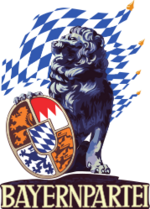Bavaria Party facts for kids
Quick facts for kids <div style="padding-top:0.3em; padding-bottom:0.3em; border-top:2px solid Lua error in Module:European_and_national_party_data/config at line 227: attempt to index field 'data' (a nil value).; border-bottom:2px solid Lua error in Module:European_and_national_party_data/config at line 227: attempt to index field 'data' (a nil value).; line-height: 1;">
Bavaria Party
Bayernpartei
|
|
|---|---|
 |
|
| Abbreviation | BP |
| Leader | Florian Weber |
| Founded | 28 October 1946 |
| Preceded by | Bavarian People's Party (not legal predecessor) |
| Headquarters | Munich, Bavaria |
| Youth wing | Young Bavarian Federation |
| Membership | 6,000(2021) |
| Ideology | Bavarian nationalism Bavarian independence Regionalism Conservatism Christian democracy Historical Faction: Anti-CSU (Jakob Fischbacher, Joseph Baumgartner, Ludwig Lallinger, Ludwig Volkholz and Ernst Falkner) |
| Political position | Centre-right |
| European affiliation | European Free Alliance |
| Colours | White, Blue |
| Bundestag | Lua error in Module:European_and_national_party_data/config at line 227: attempt to index field 'data' (a nil value). |
| Bundesrat | Lua error in Module:European_and_national_party_data/config at line 227: attempt to index field 'data' (a nil value). |
| European Parliament | Lua error in Module:European_and_national_party_data/config at line 227: attempt to index field 'data' (a nil value). |
| Landtag of Bavaria |
0 / 203
|
| Bezirktags (Bavaria) |
4 / 238
|
| Party flag | |
 |
|
| Website | |
| Lua error in Module:European_and_national_party_data/config at line 227: attempt to index field 'data' (a nil value). | |
The Bavaria Party (its German name is Bayernpartei, or BP for short) is a political group in the German state of Bavaria. This party wants Bavaria to have more control over its own decisions, or even become independent from Germany, while still being part of the European Union. It was started in 1946. The Bavaria Party is similar to an older party called the Bavarian People's Party, which existed before World War II. It is also a member of the European Free Alliance, which is a group of regional parties across Europe.
Contents
History of the Bavaria Party
The Bavaria Party had some good results in elections during the late 1940s and 1950s. In 1949, they won 20.9% of the votes in Bavaria and got 17 seats in the German Bundestag (the national parliament). In 1950, they won 17.9% of the votes and 39 seats in the Bavarian state parliament.
In 1954, the Bavaria Party joined with other parties, like the Social Democratic Party of Germany (SPD) and the Free Democratic Party (FDP), to form a government in Bavaria. This meant the Christian Social Union (CSU) was out of power for three years.
Later, the Bavaria Party quickly lost voters. This was mainly because of a political scandal in 1958. The party still exists today, but it was last elected to the Bavarian state parliament in 1962.
However, in the local elections of 2008, the party started to gain more support. They won 50 seats in local councils, which was more than the 32 seats they had in 2002. Many of these wins were in Upper Bavaria. They even won one seat in the City Council of Munich, the capital of Bavaria, after not having a seat there for 42 years.
Party Leader
The current leader of the Bavaria Party is Florian Weber. He is from Bad Aibling in Upper Bavaria.
Election Results and Performance
In the 2018 elections for the Bavarian Parliament, the Bavaria Party received 1.7% of the votes. This was a bit less than their 2.1% in 2013, which had been their best result since 1966.
After the 2018 elections, the Bavaria Party had representatives in three of Bavaria's administrative regions:
- Upper Bavaria: 2 seats
- Lower Bavaria: 1 seat
- Swabia (Bavaria): 1 seat
Overview of Election Results (1946-Present)
The table below shows how the Bavaria Party has performed in different elections over the years.
| Year | Bavarian election (Landtag) Total |
German election (Bundestag) in Bavaria |
European Parliament |
|---|---|---|---|
| 2025 | 0.2% | ||
| 2023 | 0.9% | ||
| 2021 | 0.4% | ||
| 2019 | 0.9% | ||
| 2018 | 1.7% | ||
| 2017 | 0.8% | ||
| 2014 | 1.3% | ||
| 2013 | 2.1% | 0.9% | |
| 2009 | 0.7% | 1.0% | |
| 2008 | 1.1% | ||
| 2005 | 0.5% | ||
| 2004 | 1.0% | ||
| 2003 | 0.8% | ||
| 2002 | 0.1% | ||
| 1999 | 0.4% | ||
| 1998 | 0.7% | 0.4% | |
| 1994 | 1.0% | 0.6% | 1.6% |
| 1990 | 0.8% | 0.5% | |
| 1989 | 0.8% | ||
| 1987 | 0.4% | ||
| 1986 | 0.6% | ||
| 1984 | 0.6% | ||
| 1982 | 0.5% | ||
| 1978 | 0.4% | ||
| 1974 | 0.8% | ||
| 1970 | 1.3% | ||
| 1969 | 0.9% | ||
| 1966 | 3.4% | ||
| 1962 | 4.8% | ||
| 1958 | 8.1% | ||
| 1954 | 13.2% | ||
| 1953 | 9.2% | ||
| 1950 | 17.9% | ||
| 1949 | 20.9% |
See also
 In Spanish: Partido de Baviera para niños
In Spanish: Partido de Baviera para niños
- List of political parties in Germany
- List of active separatist movements in Europe
 | Charles R. Drew |
 | Benjamin Banneker |
 | Jane C. Wright |
 | Roger Arliner Young |

